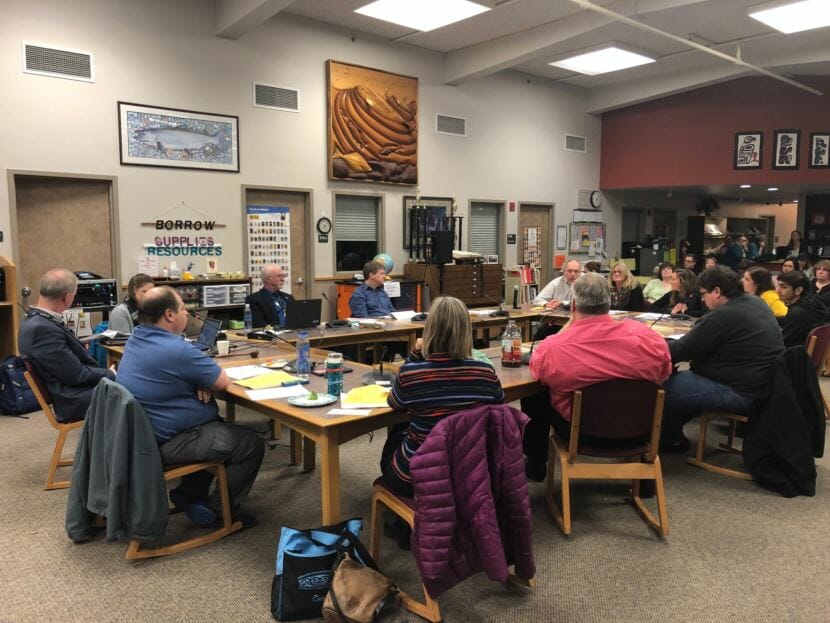
The Juneau School Board is considering adopting new curriculum for middle and high schools — based on growing national science standards. The model has been adopted entirely in 19 states, and one of the core ideas is teaching students about climate change.
The standards don’t shy away from attributing it to an increase of human activity. But how that’s taught in the classroom could be up to interpretation.
In the past five years, the way that science is taught in the classroom — across the nation — has shifted. Pop quizzes are still a thing, but the Next Generation Science Standards challenge students to think systematically.
“You still have the content there, but the focus has changed,” said Ted Wilson. He helped oversee the new curriculum for the Juneau School District, which includes activities that encourage place-based learning.
Another key part of the science standards is that students graduate with an understanding of earth and human activity, and that includes learning about climate change. The standards don’t mince words: What caused climate change to accelerate? It’s us.
The Juneau School District is borrowing some core ideas from the new standards.
But Wilson says how those ideas are taught in the classroom is up to the teachers. There’s no school district policy on climate change. Wilson’s advice is to stick to “it’s happening.”
“The aspect of how much of it is human-caused — because there is still a lot of controversy about that — is to teach it as this is one stream of thought,” Wilson said.
One stream of thought, Wilson says, that humans contributed to our most recent climate change.
“To present it like that,” Wilson said. “And for students to come away with their own opinions whether they think humans have made that impact or not.”
But Glenn Branch, a deputy director at the National Center for Science Education, says there are clear facts about who’s causing climate change to ramp up.
His nonprofit advocates for evidence-based science in the classroom.
Branch says there’s a social controversy over climate change. But there isn’t a scientific one.
Scientists all over the world have studied this. And the overwhelming majority have reached the same conclusion: humans are largely to blame. It’s not an opinion, Branch says. It involves climate models and math.
He says that doesn’t leave room for avoiding the facts or debating them.
“It’s inappropriate,” Branch said. “Both because it reinforces a false conception that there’s a legitimate scientific debate about climate change, and also because it misrepresents the nature of science.”
Still, Branch says states are trying to navigate this all across the country. With topics that can be perceived as controversial, like climate change, he says it’s understandable school districts don’t want to make waves.
He says there are social issues that can be debated, like carbon taxes. However:
“You certainly don’t have it about issues such as human impact on climate change or the shape of the earth,” Branch said.
But Ted Wilson doesn’t take issue with climate change being presented in the classroom like a debate. Has human activity accelerated it or not? He says that regularly happens in history class or language arts.
I ask him, where do you draw the line? Would flat earth theory be something he’d consent to someone teaching in a science classroom?
“As far as something that they’re asking students to debate, they could,” Wilson said.
Bottom line, Wilson says, is students should be able to think critically. And then decide on their own how to interpret the world, whether it’s flat earth theory or climate change. Regardless of what’s accelerating warming, how can we adapt? That’s the takeaway, he says.
“I think in our political climate, we don’t want teachers to be seen as people that are trying to push an agenda,” Wilson said.
Teaching students about climate change is part of the state’s science standards. But a spokesperson from the Alaska Department of Education says it’s largely up to the school districts to decide how that’s done.
Next year, the department will be able offer some new guidance. The state is currently updating its science standards. After being reviewed by teachers, parents and industry, it will be posted for public comment in 2019.
